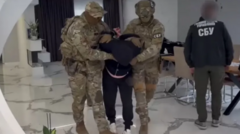Xi's approach reflects the complexities of their alliance amid global geopolitical tensions.
Xi Jinping Balances Friendship and Caution with Putin

Xi Jinping Balances Friendship and Caution with Putin
In a show of solidarity, Chinese President Xi Jinping aligns himself closely with Russia's Vladimir Putin but remains cautious of potential diplomatic repercussions.
The article text:
During a recent gathering, Chinese President Xi Jinping demonstrated his intent to maintain a close yet measured relationship with Russian President Vladimir Putin. Situated at Putin's right during the Moscow Victory Day parade, Xi expressed the "unbreakable" bond between their nations and emphasized that China and Russia are "friends of steel." This marks Xi’s 11th visit to Russia since taking office in 2013 and highlights their numerous encounters, exceeding 40 meetings.
As Putin prepares for an autumn visit to China, the two leaders seem to share a personal rapport, evidenced by occasional hugs and public displays of camaraderie. However, experts caution that the relationship encompasses more than mere gestures. "Their interactions exhibit a blend of friendship and rivalry," noted Mathieu Boulegue from the Center for European Policy Analysis. He noted that while their public personas are intertwined, underlying tensions and competition persist within their partnership.
Xi faces a delicate balancing act. Despite Russia being a vital ally, Putin's international isolation due to the Ukraine conflict poses risks for Beijing. President Xi must safeguard China's interest in fostering global relationships, especially as it navigates a complex economic rivalry with the United States. Following Beijing's outreach to European leaders, the potential consequences of appearing too close to Moscow become increasingly apparent, particularly as China has maintained a non-condemning stance regarding Russia's actions.
As Xi seeks to affirm this relationship, he implicitly sends a counter-message to the U.S., particularly former President Trump, whose attempts to exploit bonds with Putin might threaten these ties. "Together, we must foil all schemes to disrupt or undermine our bonds of amity and trust," Xi stated in a signed article for Russian media, highlighting their united front against perceived U.S. hegemony. Both leaders share a vision of an alternative global order amid ongoing tensions.
However, Xi is acutely aware of the shifting power dynamics. With Russia's economy weakened and its military resources stretched thin due to sanctions, the asymmetry in their relationship is undeniable. Boulegue remarked, "Russia needs China much more than the opposite is true," indicating a shift toward a more dependent partnership.
While the two leaders may present a unified front as they observe military displays together, the complexities within their alliance suggest potential sources of discord that could emerge in the future. As they march side by side, the balance of power hangs uncertainly in the air.
During a recent gathering, Chinese President Xi Jinping demonstrated his intent to maintain a close yet measured relationship with Russian President Vladimir Putin. Situated at Putin's right during the Moscow Victory Day parade, Xi expressed the "unbreakable" bond between their nations and emphasized that China and Russia are "friends of steel." This marks Xi’s 11th visit to Russia since taking office in 2013 and highlights their numerous encounters, exceeding 40 meetings.
As Putin prepares for an autumn visit to China, the two leaders seem to share a personal rapport, evidenced by occasional hugs and public displays of camaraderie. However, experts caution that the relationship encompasses more than mere gestures. "Their interactions exhibit a blend of friendship and rivalry," noted Mathieu Boulegue from the Center for European Policy Analysis. He noted that while their public personas are intertwined, underlying tensions and competition persist within their partnership.
Xi faces a delicate balancing act. Despite Russia being a vital ally, Putin's international isolation due to the Ukraine conflict poses risks for Beijing. President Xi must safeguard China's interest in fostering global relationships, especially as it navigates a complex economic rivalry with the United States. Following Beijing's outreach to European leaders, the potential consequences of appearing too close to Moscow become increasingly apparent, particularly as China has maintained a non-condemning stance regarding Russia's actions.
As Xi seeks to affirm this relationship, he implicitly sends a counter-message to the U.S., particularly former President Trump, whose attempts to exploit bonds with Putin might threaten these ties. "Together, we must foil all schemes to disrupt or undermine our bonds of amity and trust," Xi stated in a signed article for Russian media, highlighting their united front against perceived U.S. hegemony. Both leaders share a vision of an alternative global order amid ongoing tensions.
However, Xi is acutely aware of the shifting power dynamics. With Russia's economy weakened and its military resources stretched thin due to sanctions, the asymmetry in their relationship is undeniable. Boulegue remarked, "Russia needs China much more than the opposite is true," indicating a shift toward a more dependent partnership.
While the two leaders may present a unified front as they observe military displays together, the complexities within their alliance suggest potential sources of discord that could emerge in the future. As they march side by side, the balance of power hangs uncertainly in the air.





















